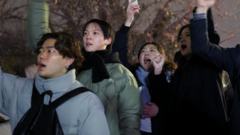Political Chaos Erupts in South Korea as President Declares and Quickly Revokes Martial Law
South Korea was thrown into a state of confusion and anxiety on Tuesday when President Yoon Suk Yeol unexpectedly declared martial law, only to have the measure swiftly blocked by parliament hours later. The dramatic political event left citizens shocked and fearful about the potential consequences.
In a televised address, President Yoon claimed martial law was necessary to protect the country from North Korean communist forces and eliminate anti-state elements. Immediately following his announcement, the military suspended all parliamentary activity, and a heavy police presence was deployed around the National Assembly in Seoul.
The sudden declaration triggered widespread concern among South Koreans. Ra Ji-soo, a Seoul resident, compared the situation to a potential coup d’état, expressing worry about the unfolding events. Some citizens, like Kim Mi-rim, even prepared emergency kits, recalling previous instances of martial law that involved arrests and imprisonment.
Many South Koreans viewed the move as an attempt to suppress political opposition and restrict freedom of expression. An anonymous woman interviewed feared that South Korea might be transforming into “another North Korea,” highlighting the deep anxiety surrounding the president’s actions.
The economic implications were also a significant concern. Don Jung Kang, a small business owner, worried about potential massive damage to his business, noting that the president’s words had already caused the currency to crash and could severely impact importing materials.
As news spread, the opposition Democratic Party called on lawmakers and the public to gather outside the National Assembly. Protesters quickly assembled, chanting slogans like “no to martial law” and “strike down dictatorship.” Clashes between police and protesters erupted, with live streams showing tense confrontations.
University student Juye Hong described the atmosphere as a “complete nightmare,” with her friends and family frantically texting and trying to understand the situation. Rumors circulated about soldiers and tanks across major city districts, adding to the uncertainty.
In a dramatic turn of events, parliament voted down the martial law measure, forcing President Yoon to revoke his declaration. The swift rejection transformed the tense atmosphere into one of jubilation, with protesters celebrating outside the parliament complex.
The incident exposed significant political tensions in South Korea and raised questions about the stability of the country’s democratic institutions. It also highlighted the deep concerns among citizens about potential authoritarian tendencies and the preservation of democratic freedoms.
The rapid sequence of events – from declaration to rejection – left many South Koreans bewildered and uncertain about the future political landscape, demonstrating the fragility of democratic processes and the importance of institutional checks and balances.




